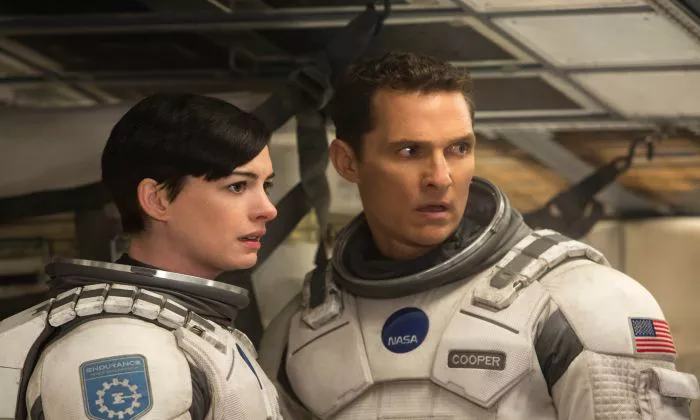Introduction to “Interstellar”
Christopher Nolan‘s 2014 epic science fiction film, “Interstellar,” stands as a cinematic marvel that transcends the boundaries of the genre. Its gripping narrative, breathtaking visuals, and profound themes have captivated audiences worldwide, earning critical acclaim and leaving an indelible mark on the landscape of modern cinema. Through a fusion of cutting-edge science, emotional depth, and philosophical inquiry, “Interstellar” explores the human condition and our enduring quest for meaning amidst the vastness of the cosmos.
Reasons for Its Good Review
At the heart of “Interstellar” lies its compelling storyline, crafted by Nolan and his brother Jonathan Nolan. Set in a dystopian future where Earth is ravaged by environmental catastrophe, the film follows a team of astronauts led by Cooper (Matthew McConaughey) as they embark on a perilous journey through a wormhole in search of a new habitable world for humanity. The narrative seamlessly weaves together elements of science fiction, drama, and adventure, drawing viewers into a mesmerizing tale of exploration, sacrifice, and the bonds of love that transcend time and space.
One of the film’s most striking features is its stunning visual effects, which were meticulously crafted to bring the wonders of the cosmos to life. From the awe-inspiring vistas of distant planets to the breathtaking spectacle of a black hole, “Interstellar” immerses viewers in a visually stunning journey through the cosmos. Much of the film’s visual realism can be attributed to the collaboration between Nolan and renowned theoretical physicist Kip Thorne, who served as a scientific consultant on the project. Thorne’s expertise helped ensure that the film’s depictions of space phenomena were grounded in scientific accuracy, lending an added layer of authenticity to the experience.
Beyond its technical achievements, “Interstellar” resonates deeply with audiences due to its exploration of profound philosophical and existential themes. Central to the film is the concept of time dilation, a consequence of Einstein’s theory of relativity, which plays a crucial role in the narrative as the astronauts grapple with the effects of time passing at different rates in the far reaches of space. This temporal distortion serves as a potent metaphor for the passage of time in human life, prompting viewers to reflect on the fleeting nature of existence and the choices we make in the face of uncertainty.
Moreover, “Interstellar” delves into the nature of human connection and the enduring power of love as a driving force in the universe. The relationship between Cooper and his daughter Murph (Jessica Chastain) forms the emotional core of the film, transcending the bounds of time and space to become a beacon of hope in a seemingly hopeless world. Through their unwavering bond, “Interstellar” explores the timeless themes of sacrifice, redemption, and the profound impact of individual choices on the course of history.
The film’s thematic richness is further enhanced by its haunting musical score, composed by Hans Zimmer. Zimmer’s evocative soundtrack serves as a powerful emotional anchor, heightening the film’s dramatic moments and imbuing the narrative with a sense of grandeur and wonder. From the haunting strains of “Cornfield Chase” to the epic crescendos of “No Time for Caution,” Zimmer’s music elevates “Interstellar” to new heights, immersing viewers in a symphony of sound and emotion.
In addition to its artistic merits, “Interstellar” has also sparked widespread interest and discussion among scientists, philosophers, and film enthusiasts alike. The film’s exploration of complex scientific concepts such as black holes, wormholes, and time dilation has led to numerous scholarly analyses and debates, further enriching its cultural impact and cementing its status as a modern classic.
Moreover, “Interstellar” serves as a poignant reminder of the fragility of our planet and the urgent need for humanity to confront the challenges of climate change and environmental degradation. Through its dystopian vision of a world on the brink of collapse, the film prompts viewers to reflect on the consequences of our actions and the importance of stewardship in preserving the Earth for future generations.
In conclusion, “Interstellar” stands as a towering achievement in modern cinema, combining stunning visuals, a gripping narrative, and profound themes to create an unforgettable cinematic experience. Through its exploration of science, philosophy, and human emotion, the film invites viewers on a transcendent journey through space and time, challenging them to ponder the mysteries of the universe and the nature of their own existence. As humanity continues its quest to explore the cosmos and unlock the secrets of the universe, “Interstellar” will undoubtedly endure as a timeless masterpiece that inspires and enchants audiences for generations to come.
Related Topics:
Behind the Scenes of Battle: Los Angeles: Crafting an Epic Sci-Fi Action Adventure

